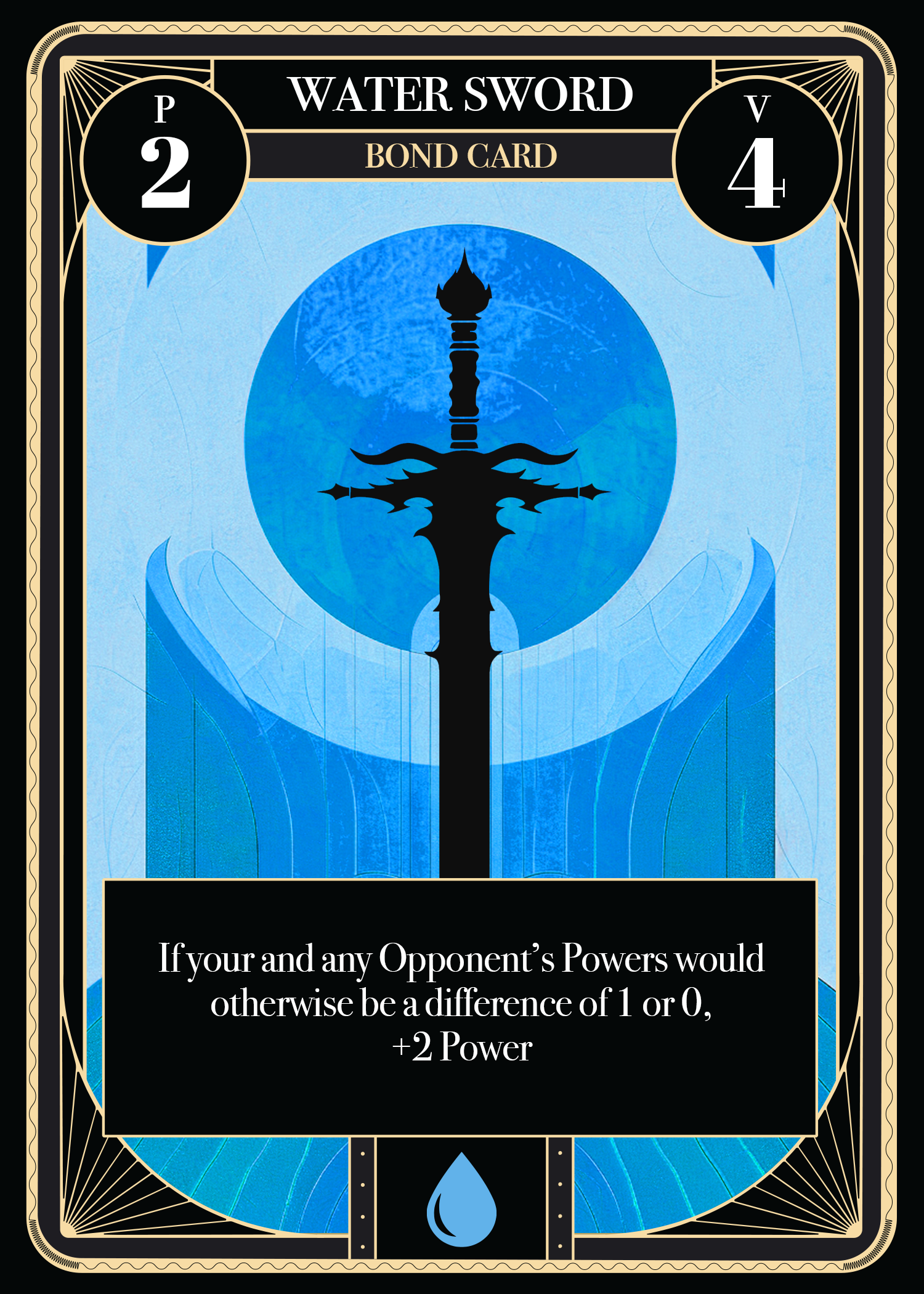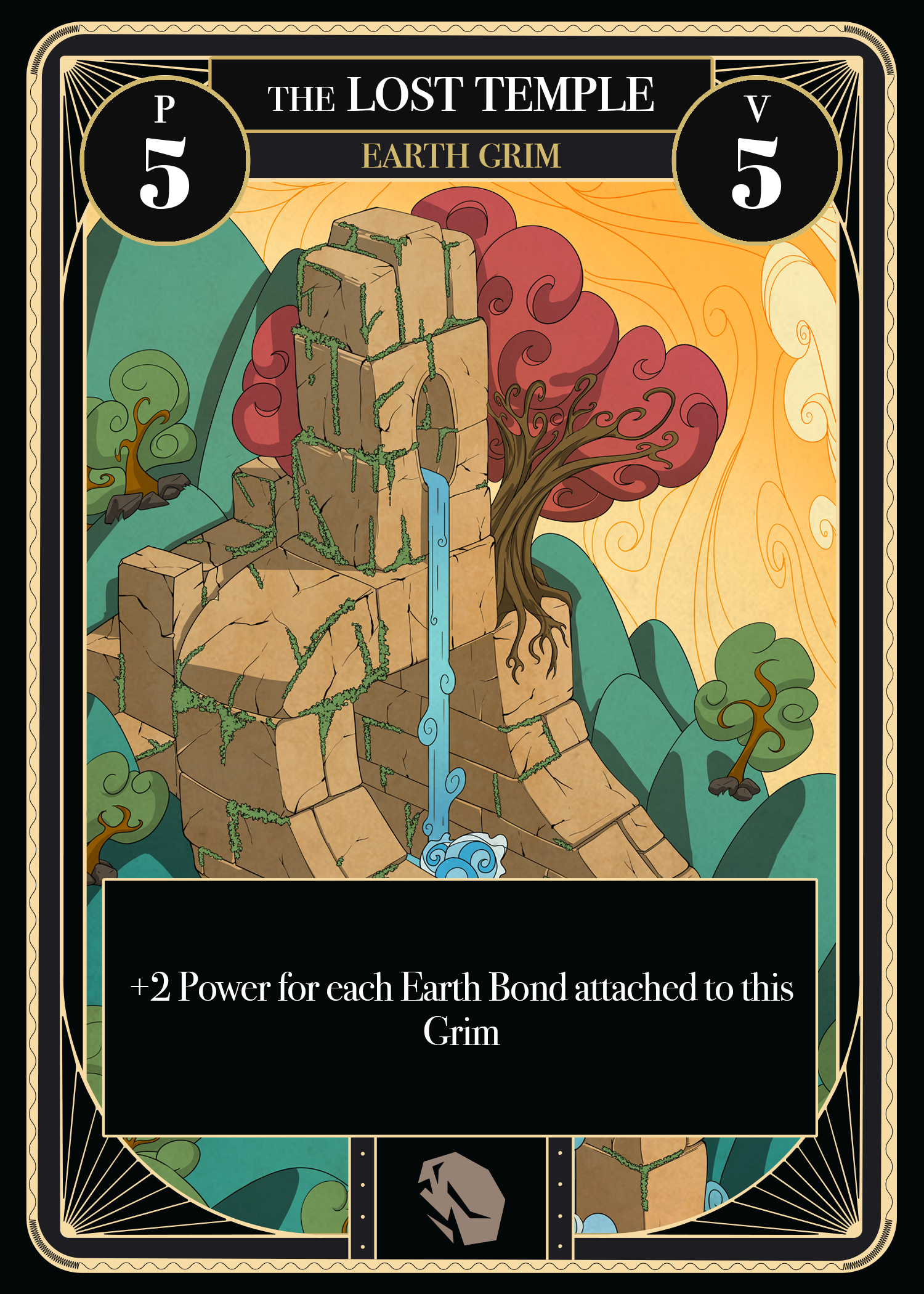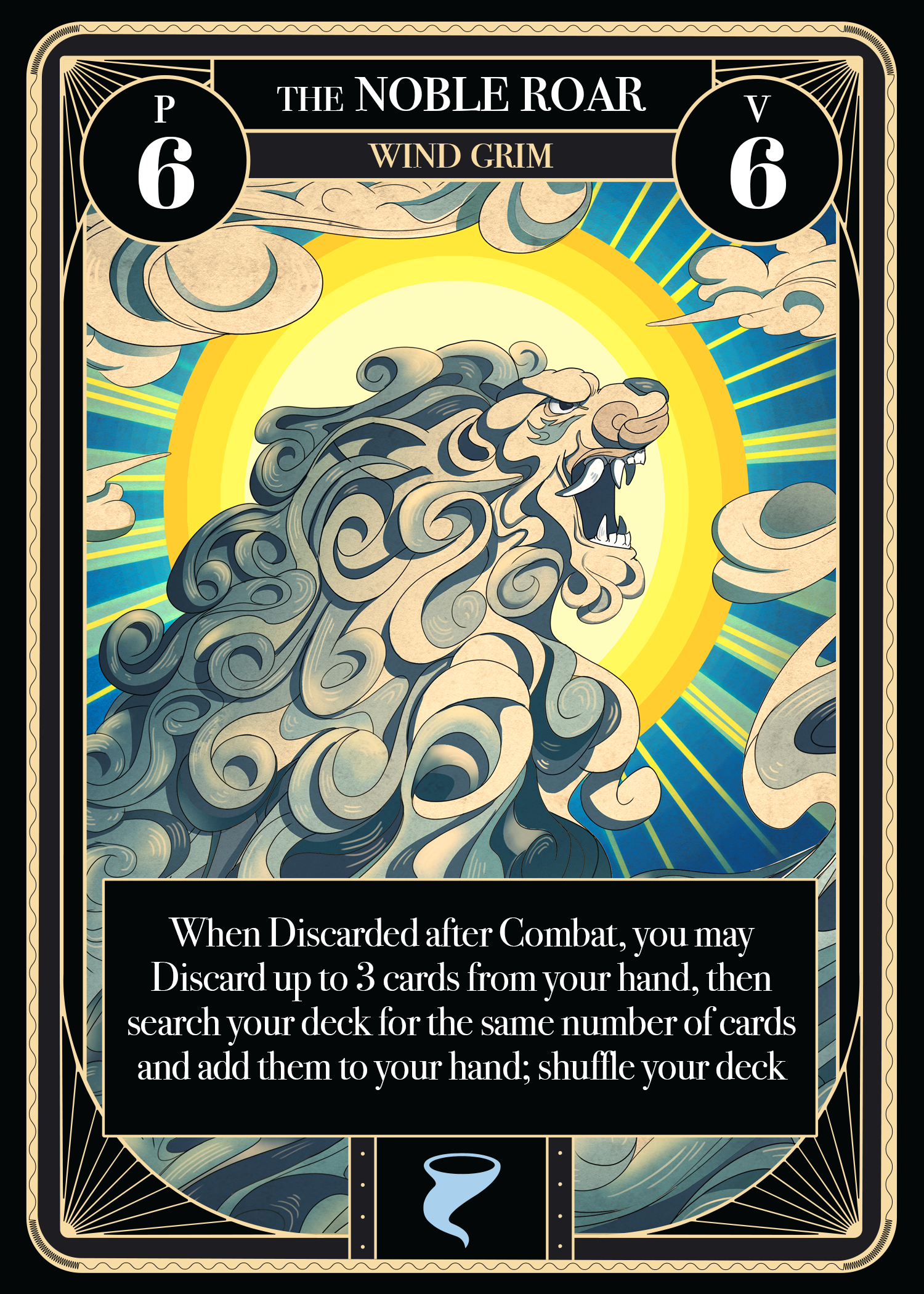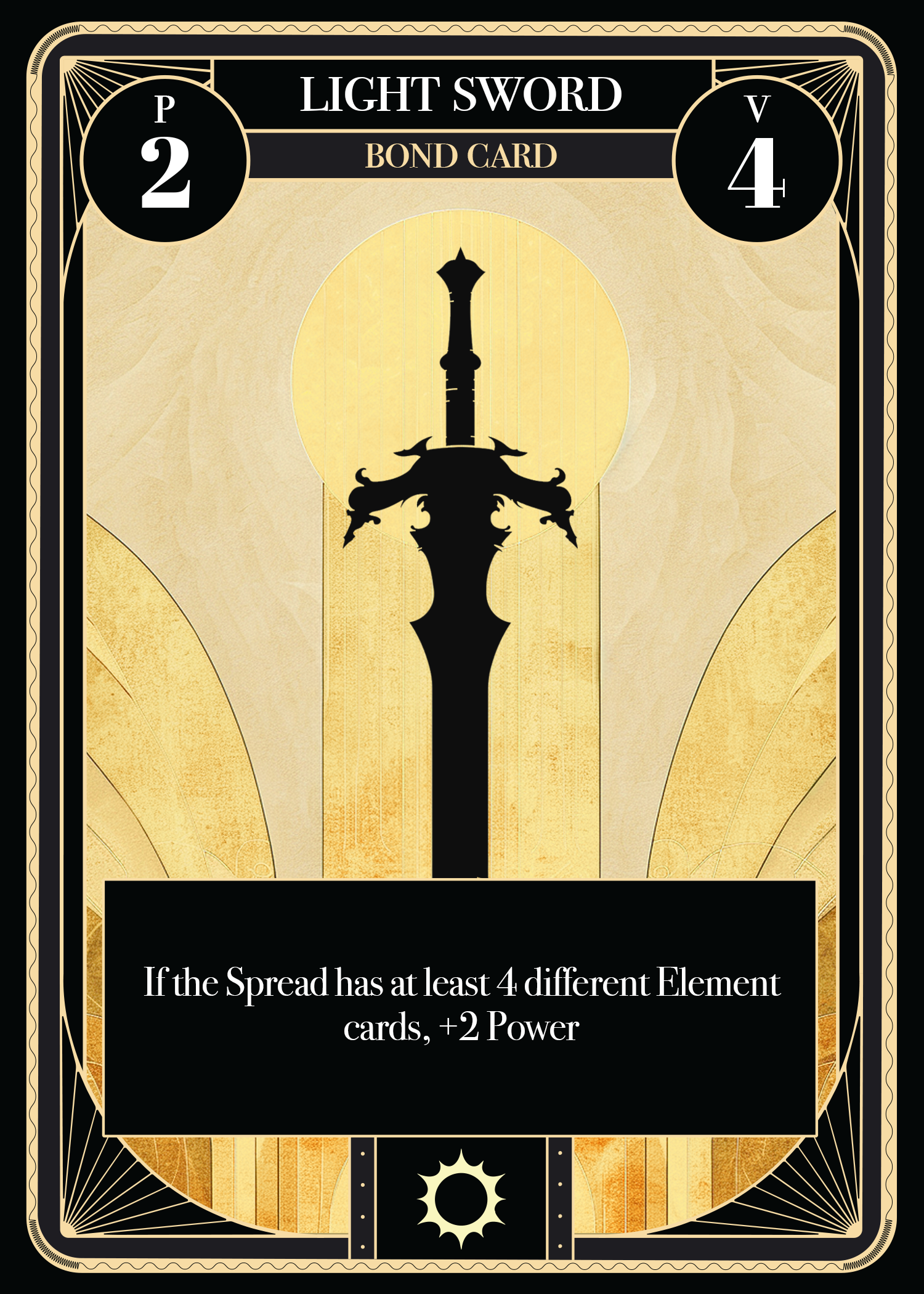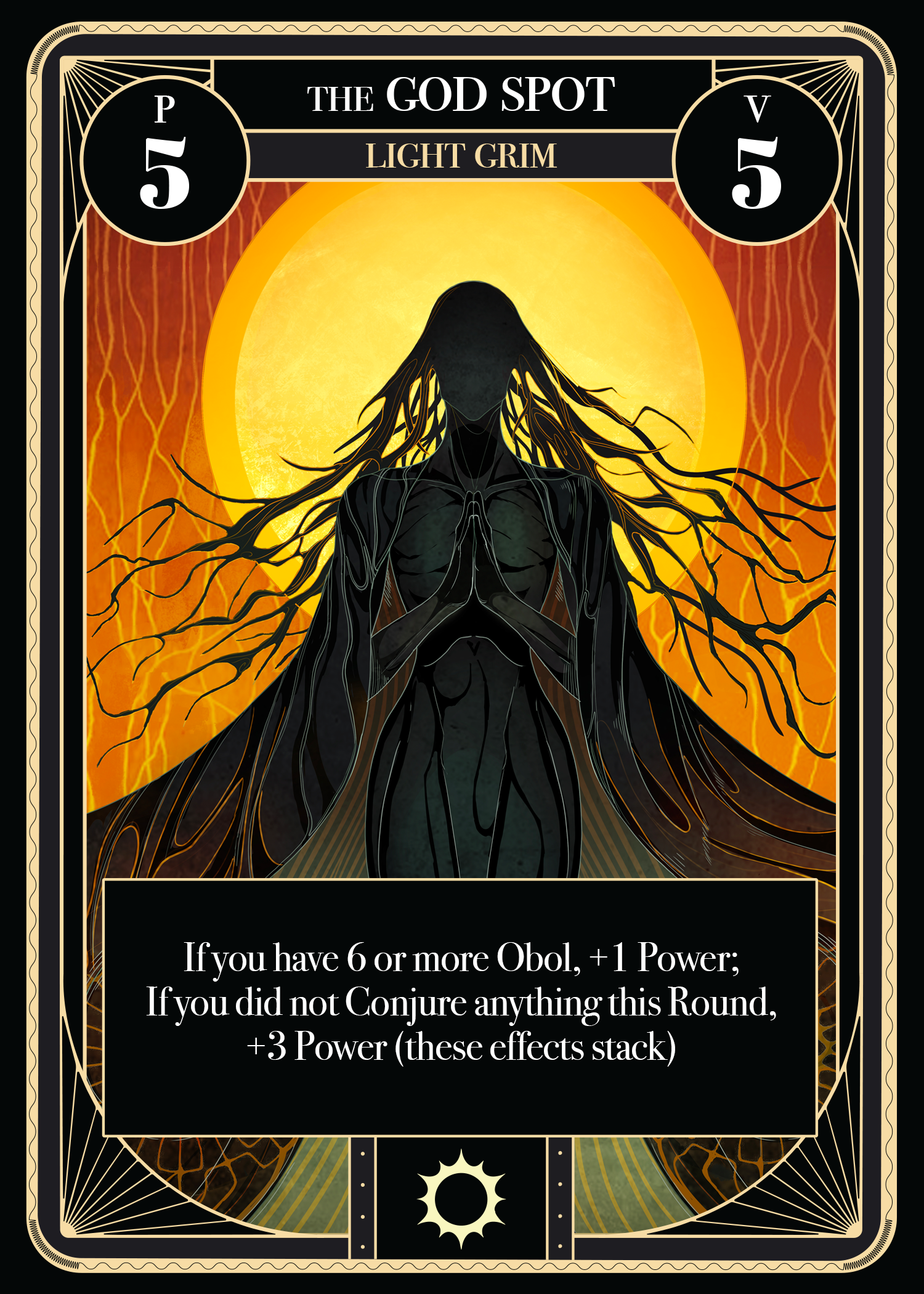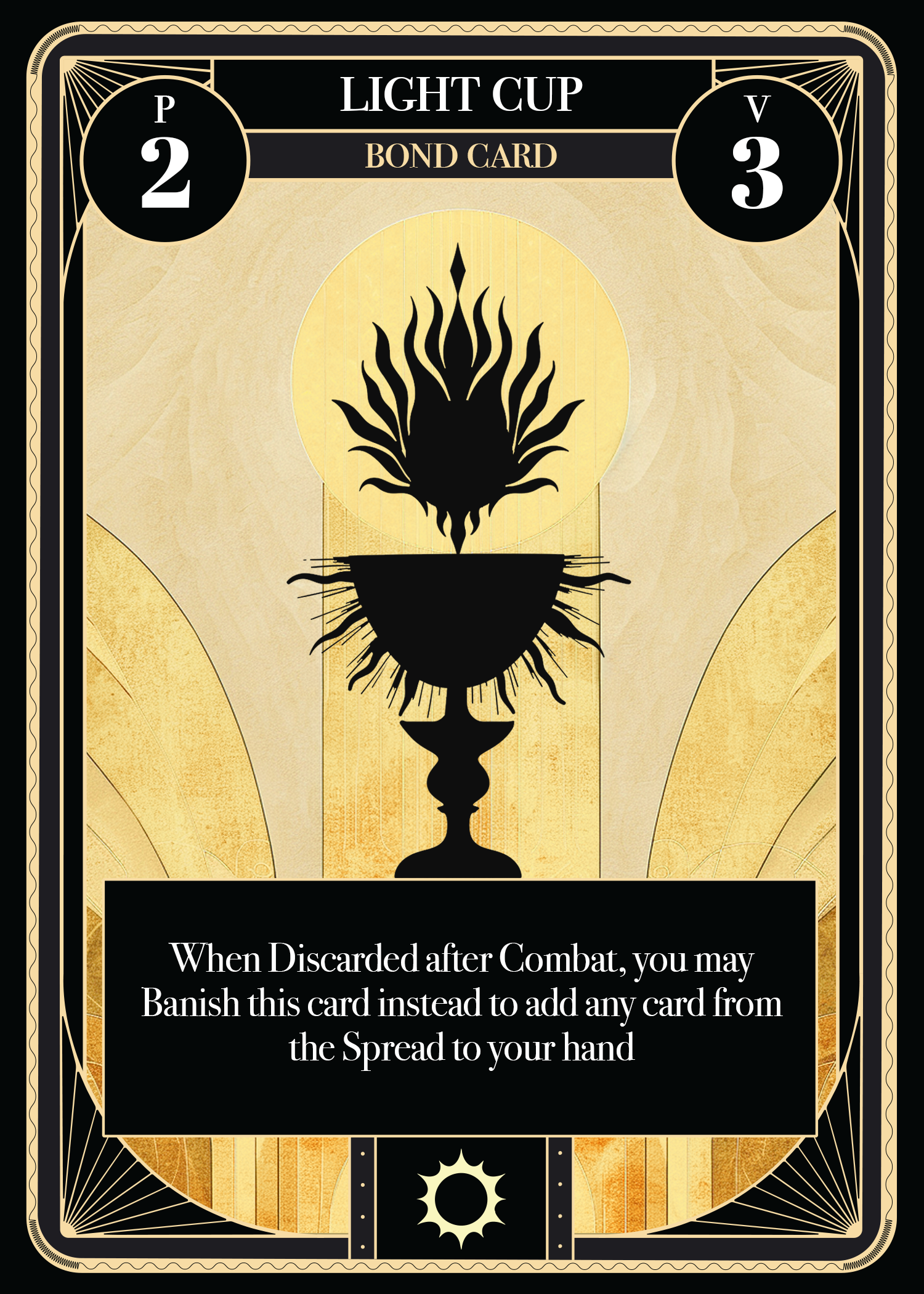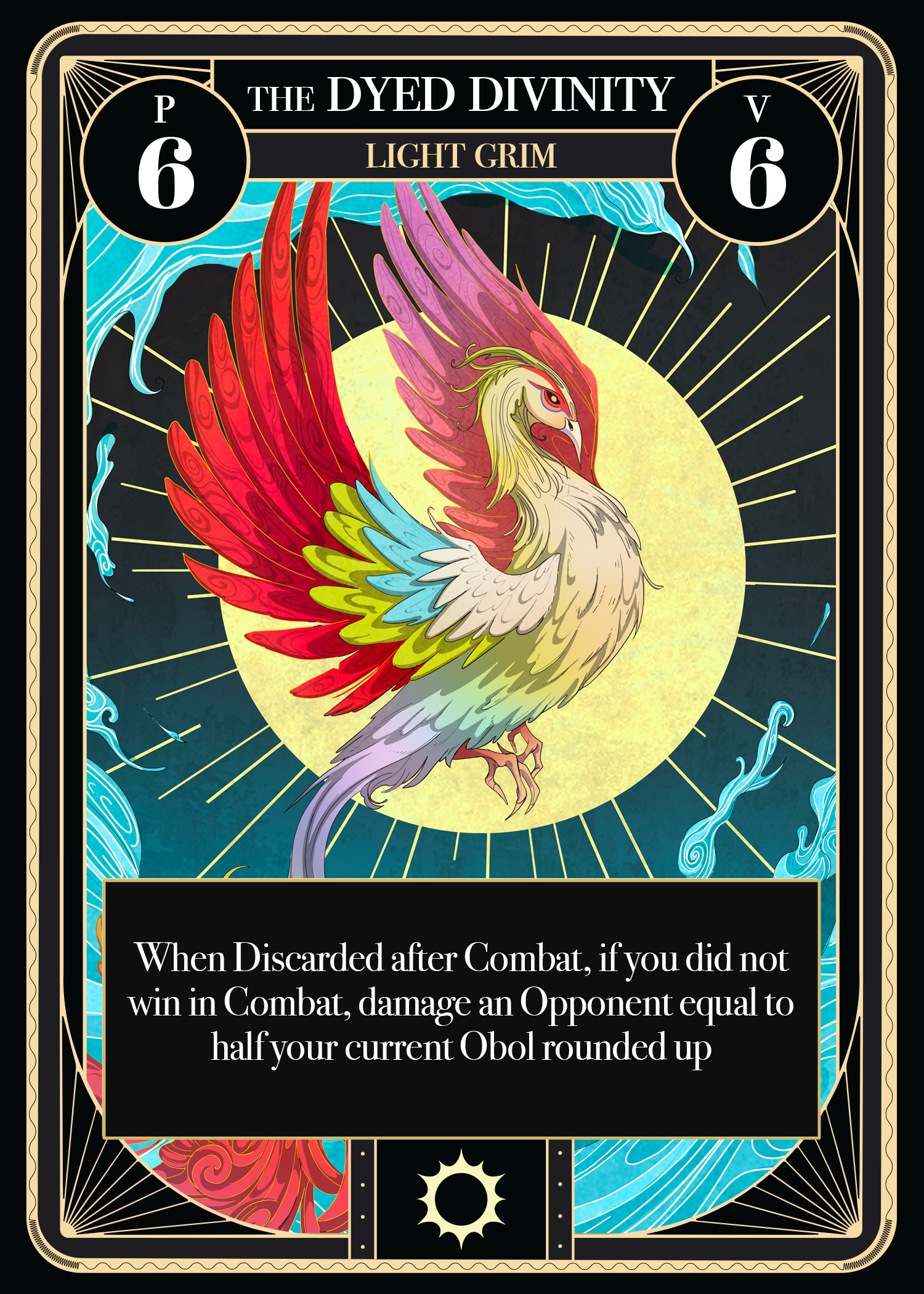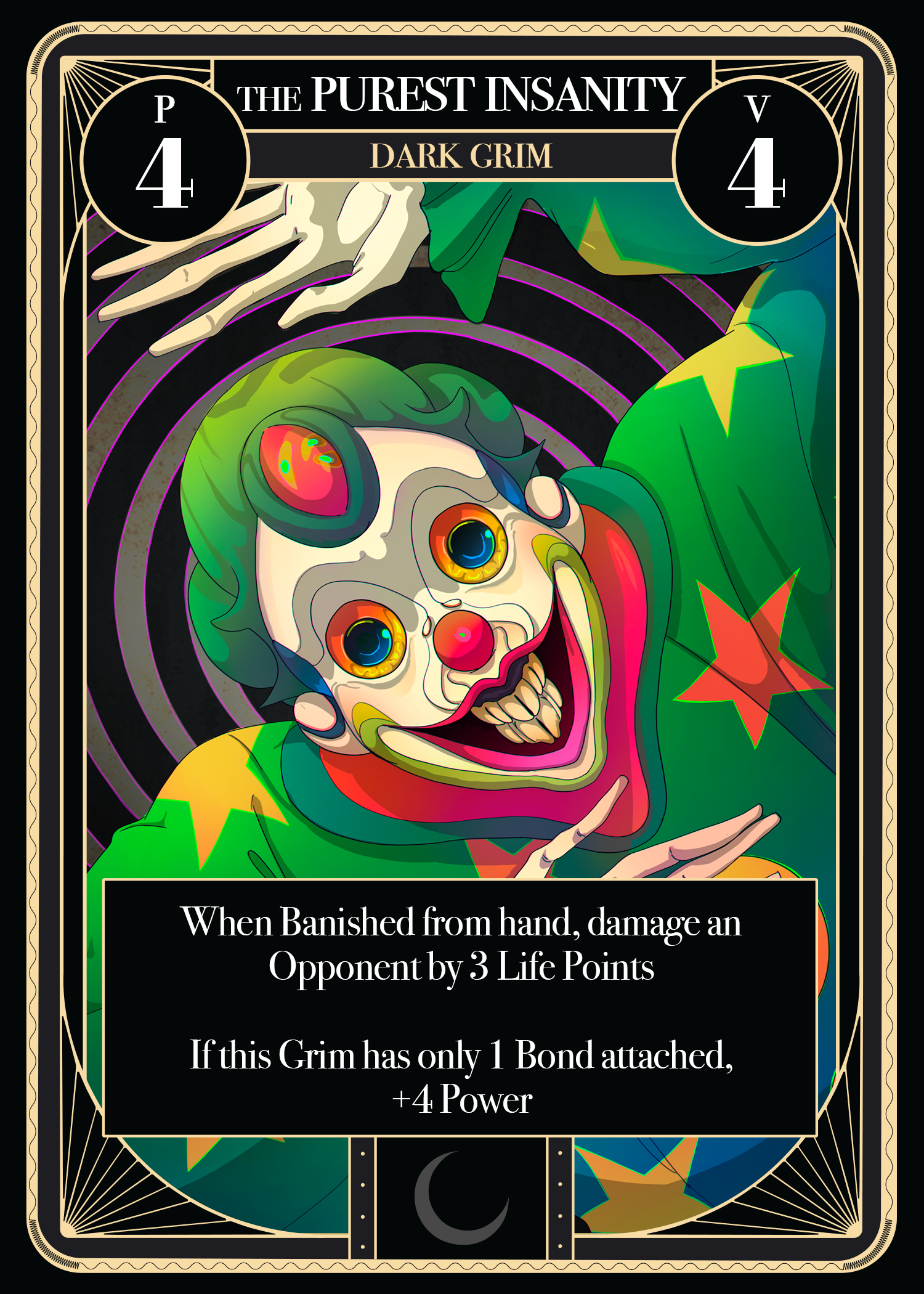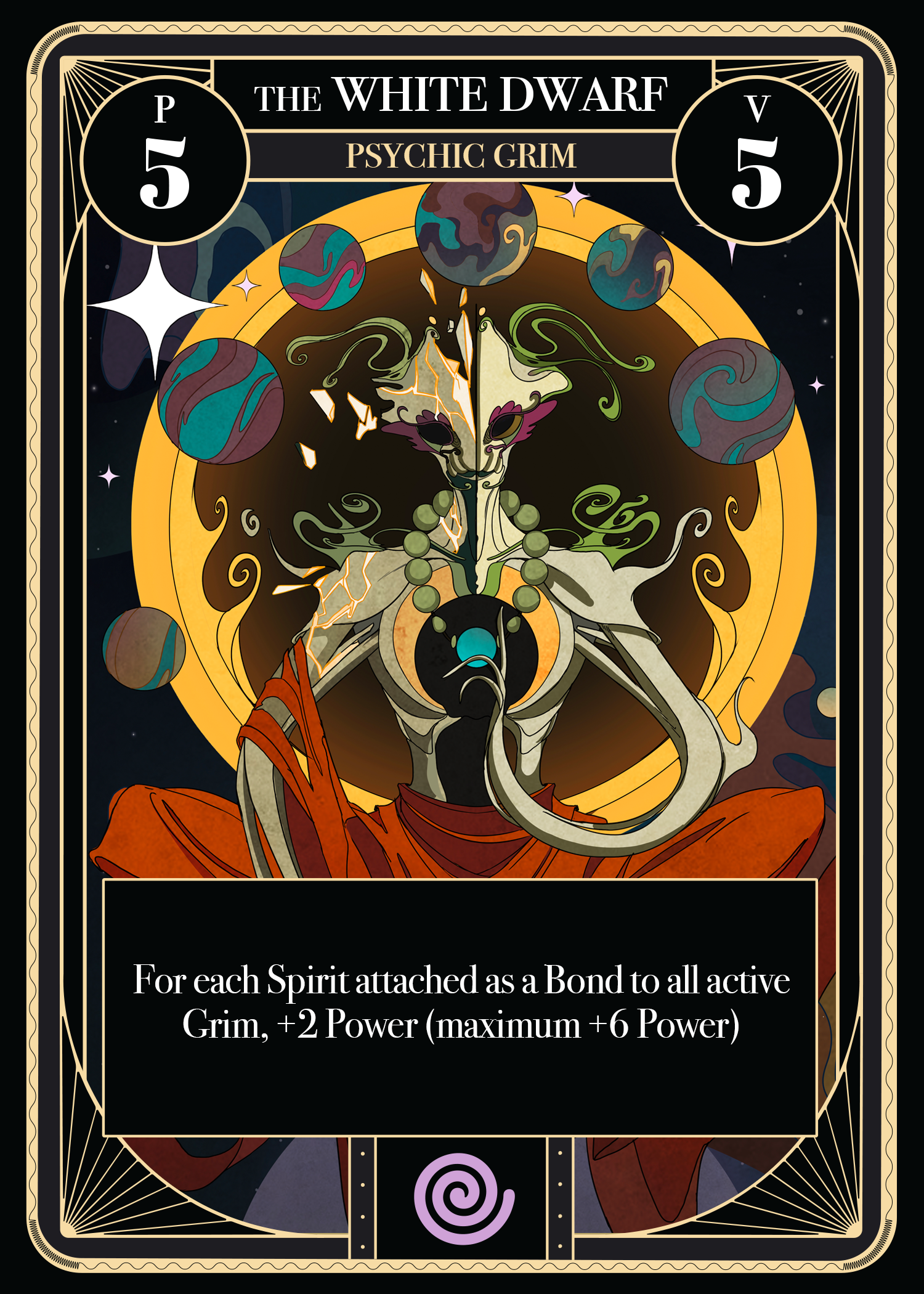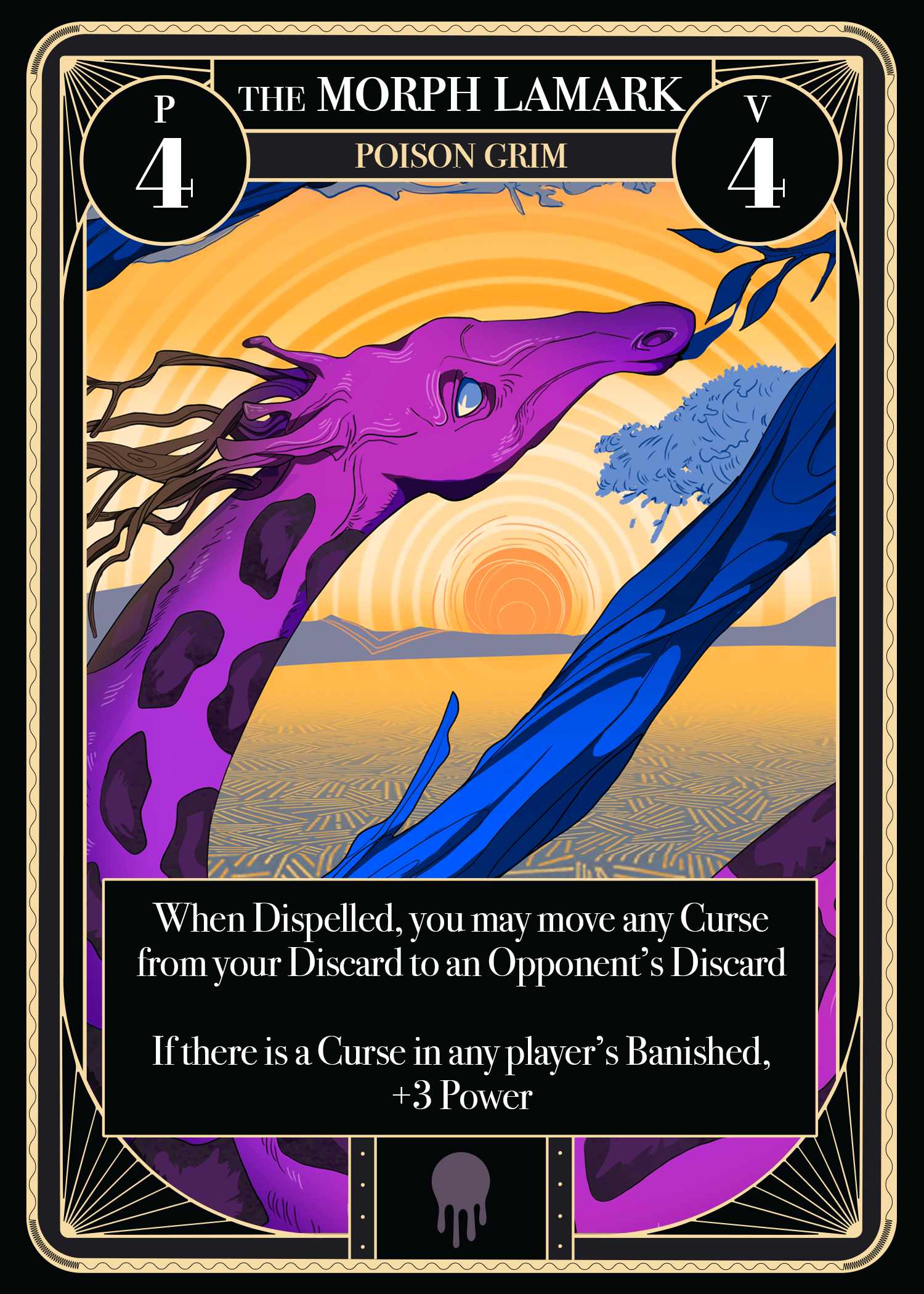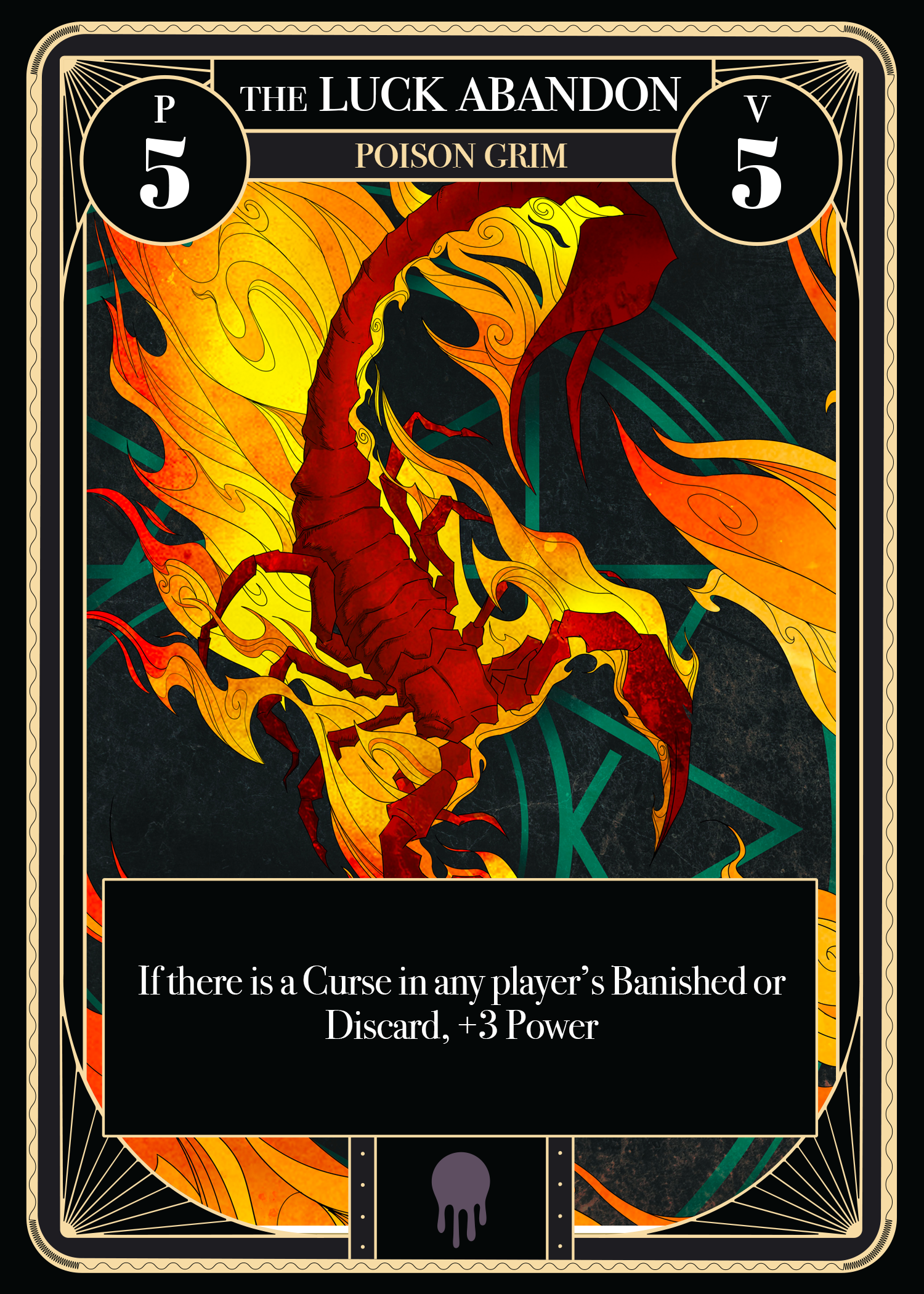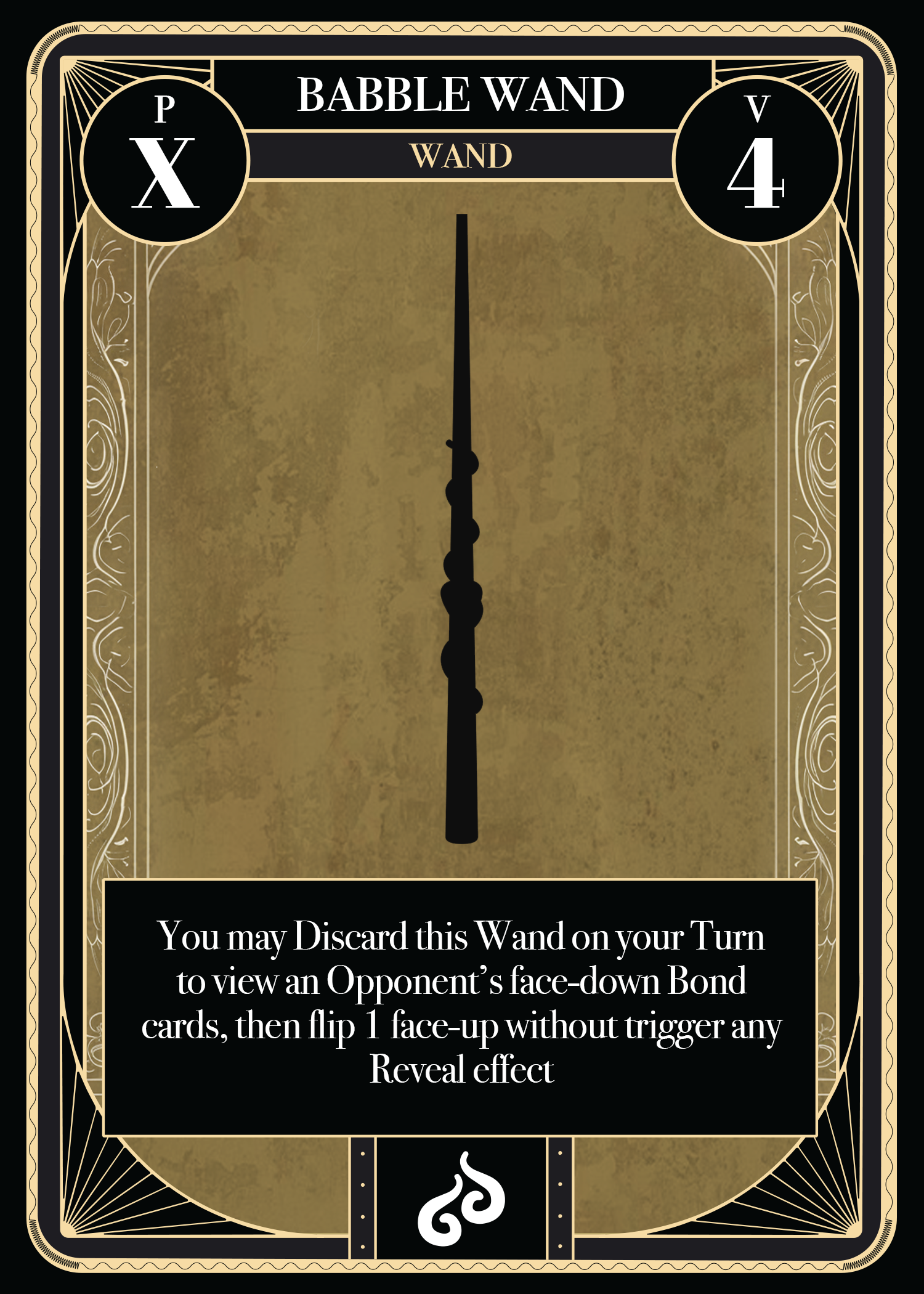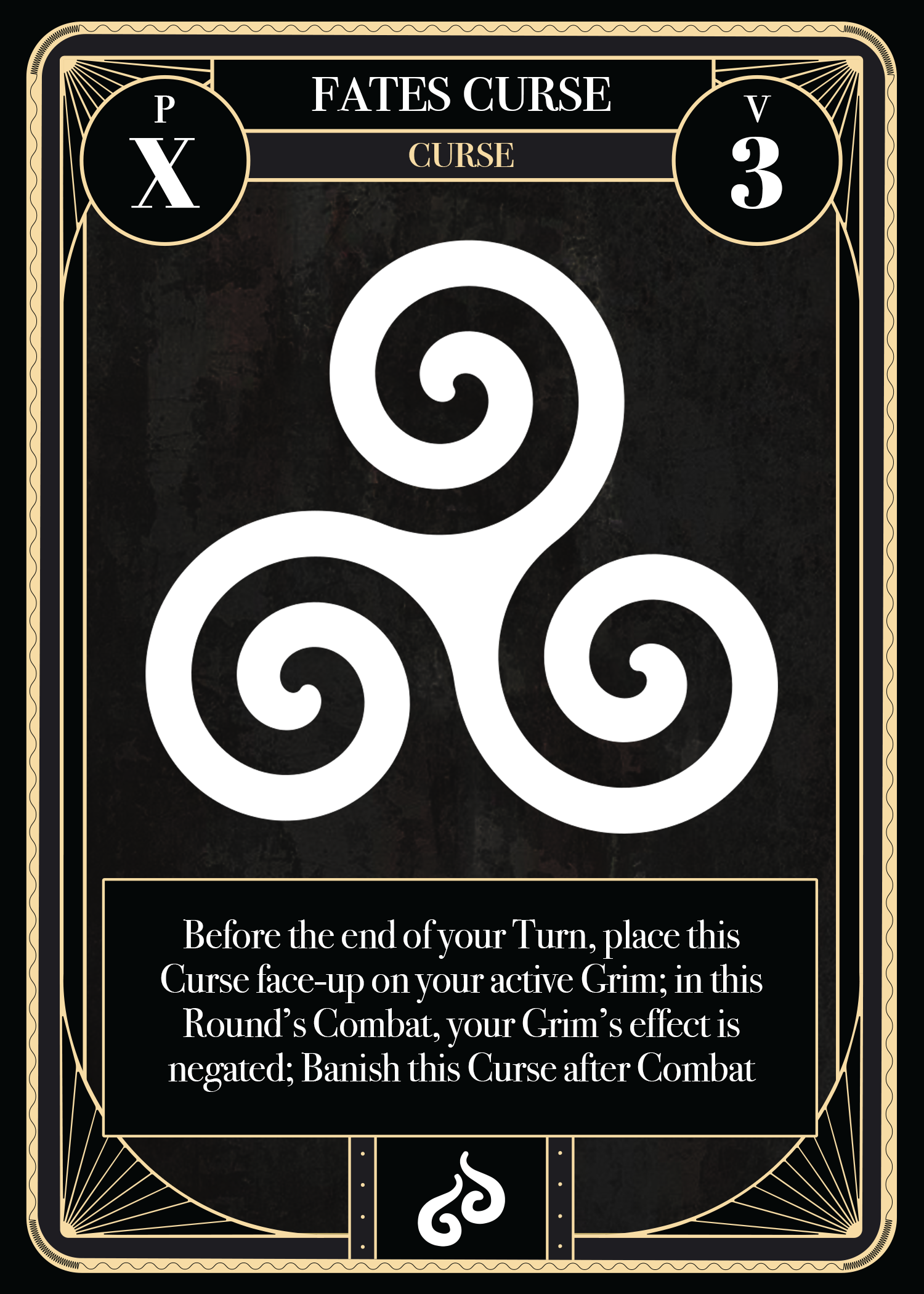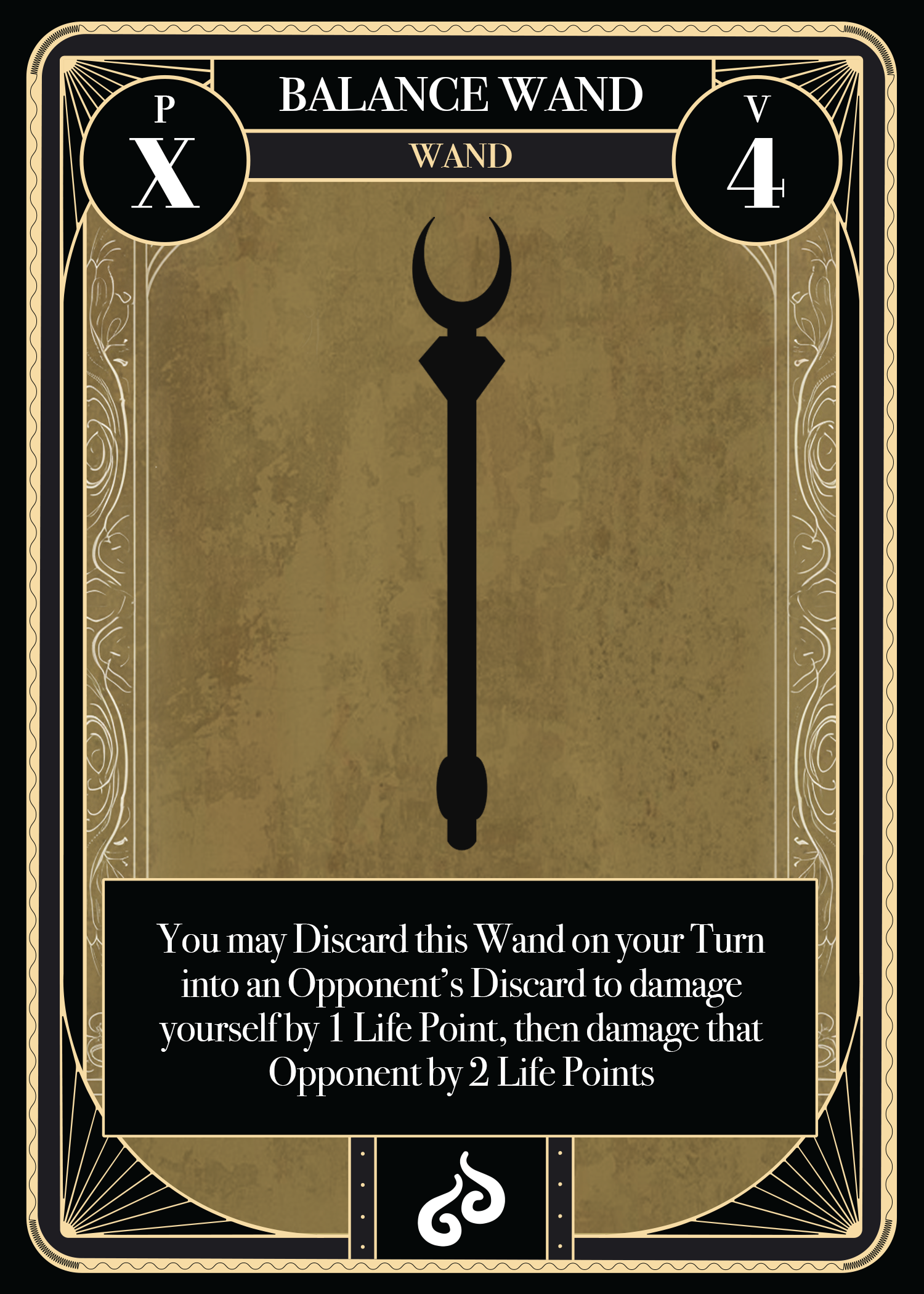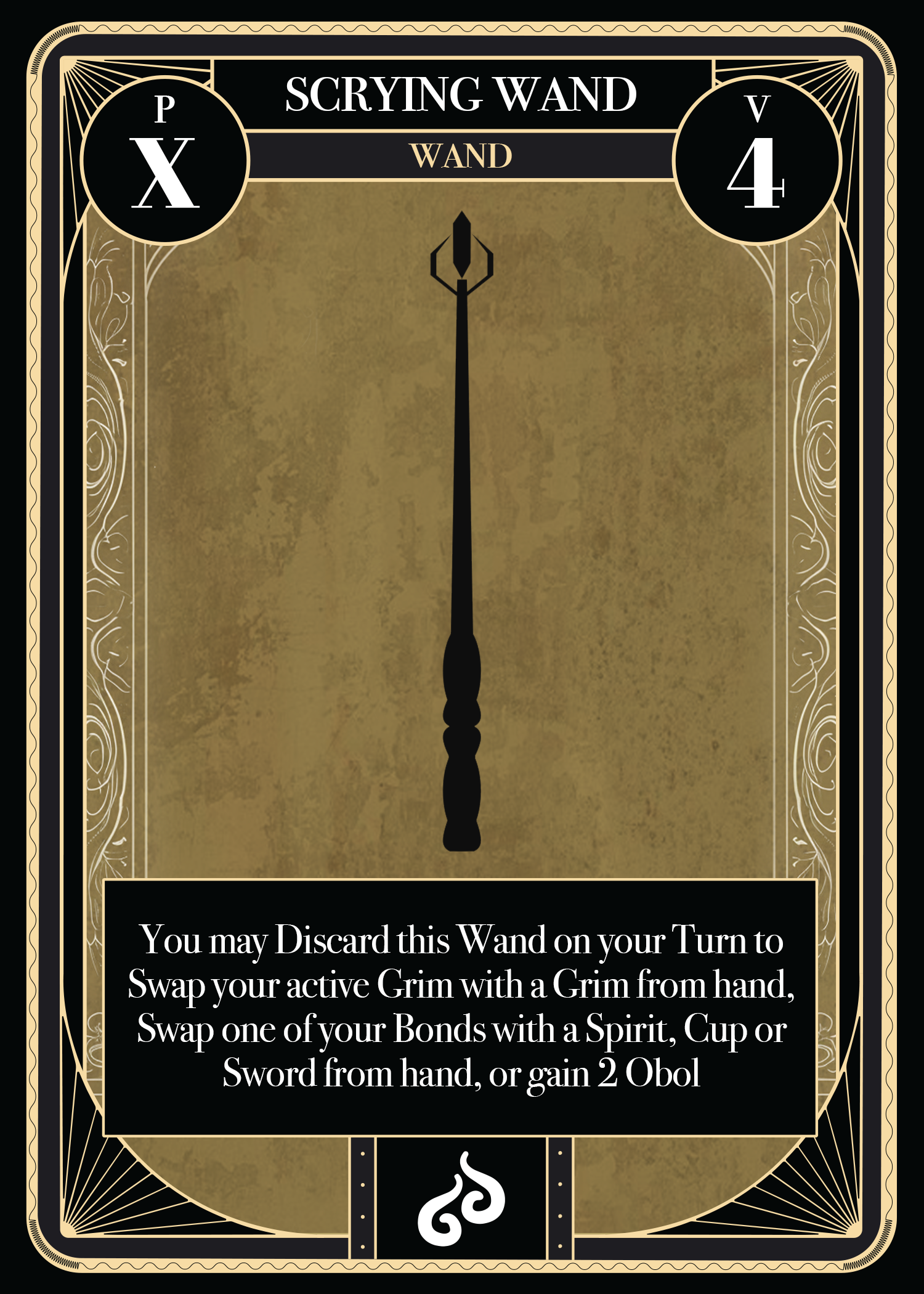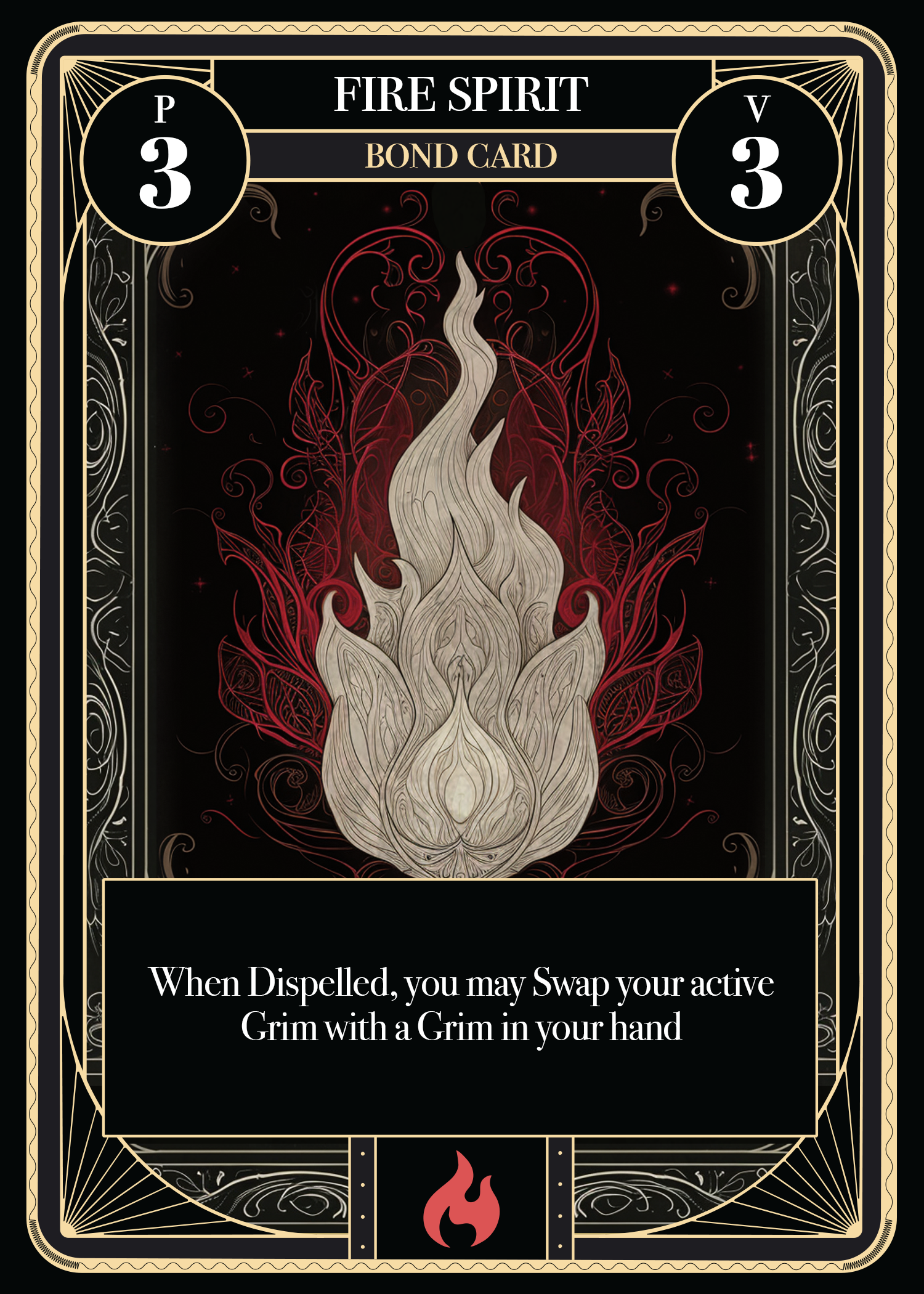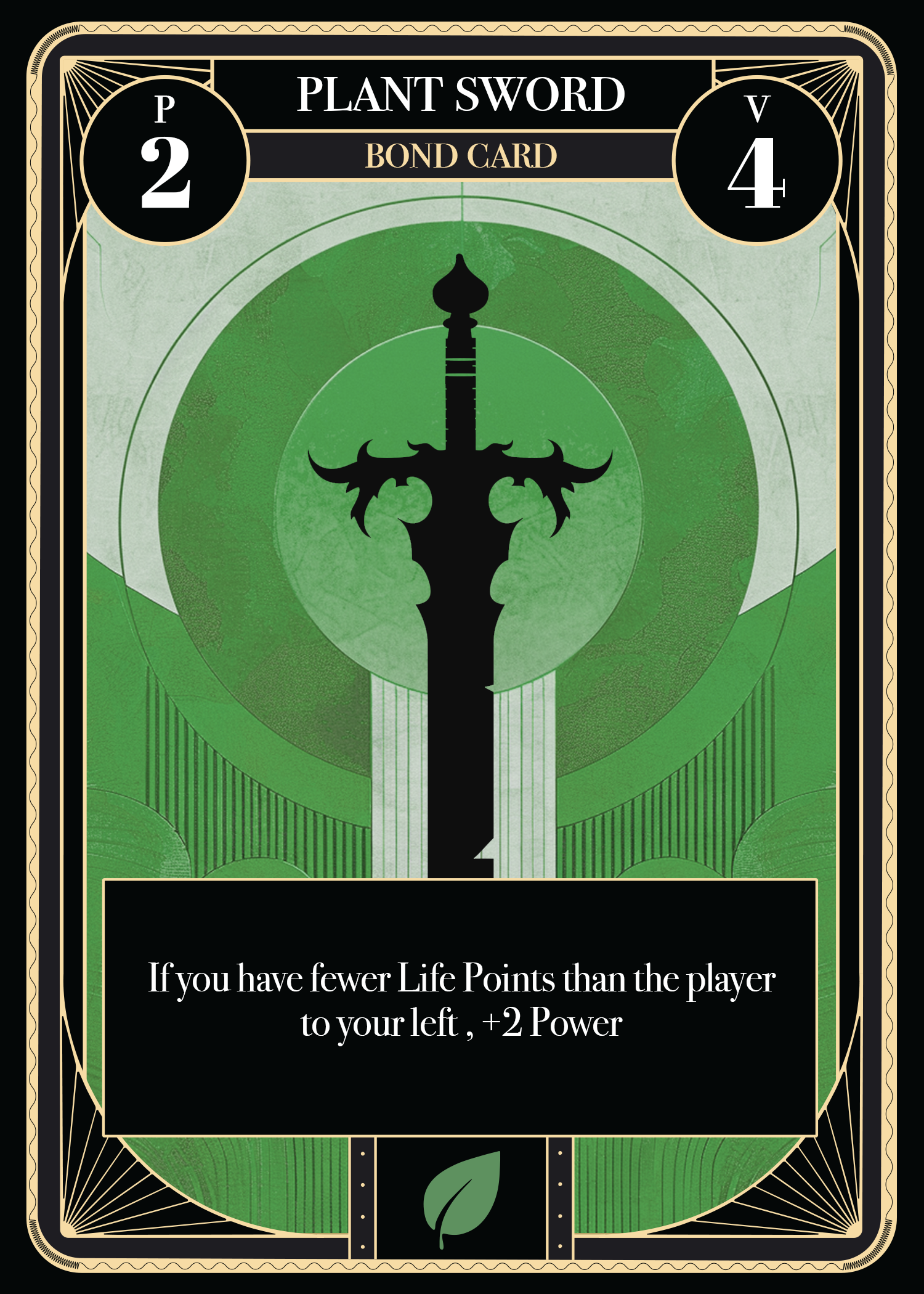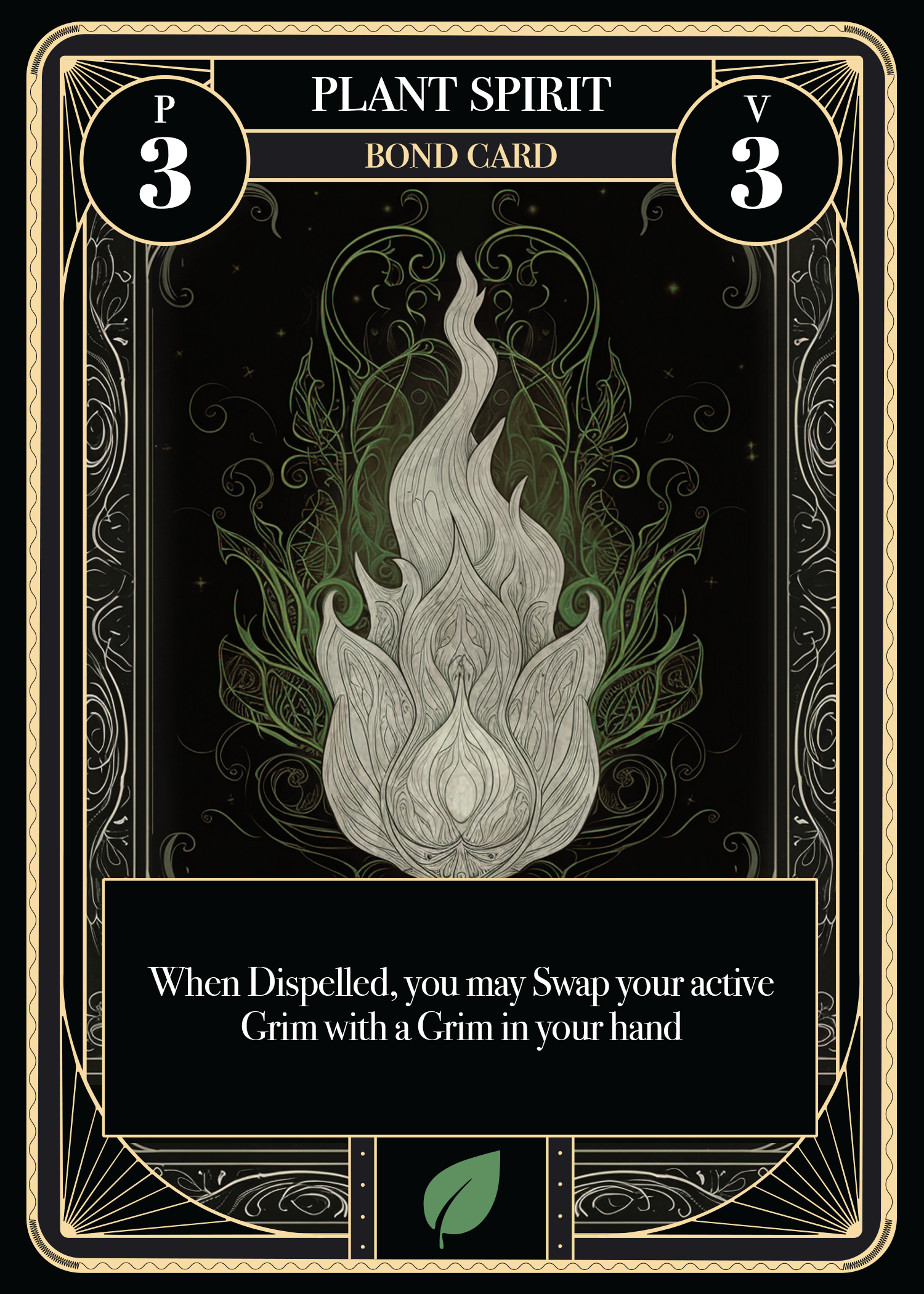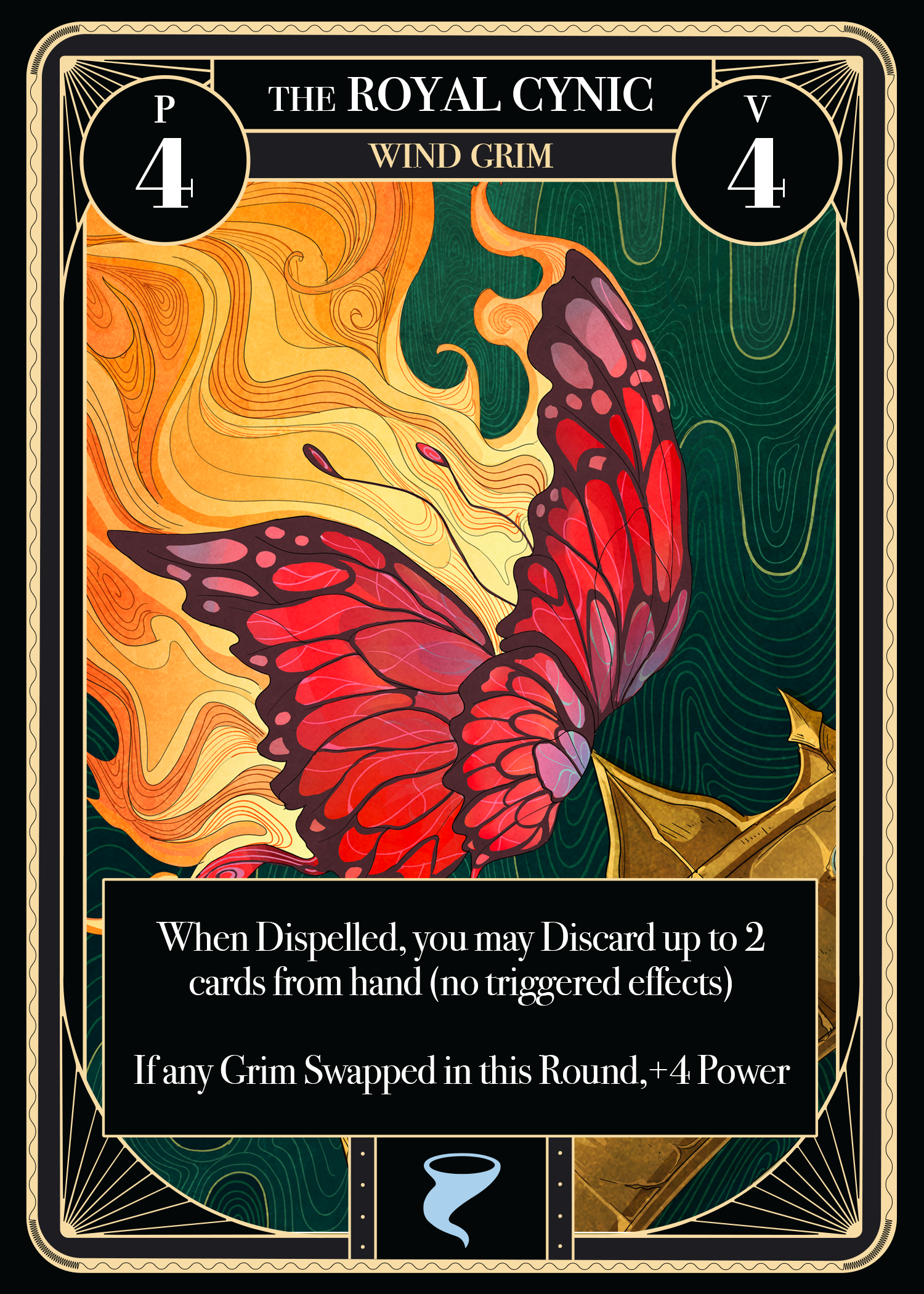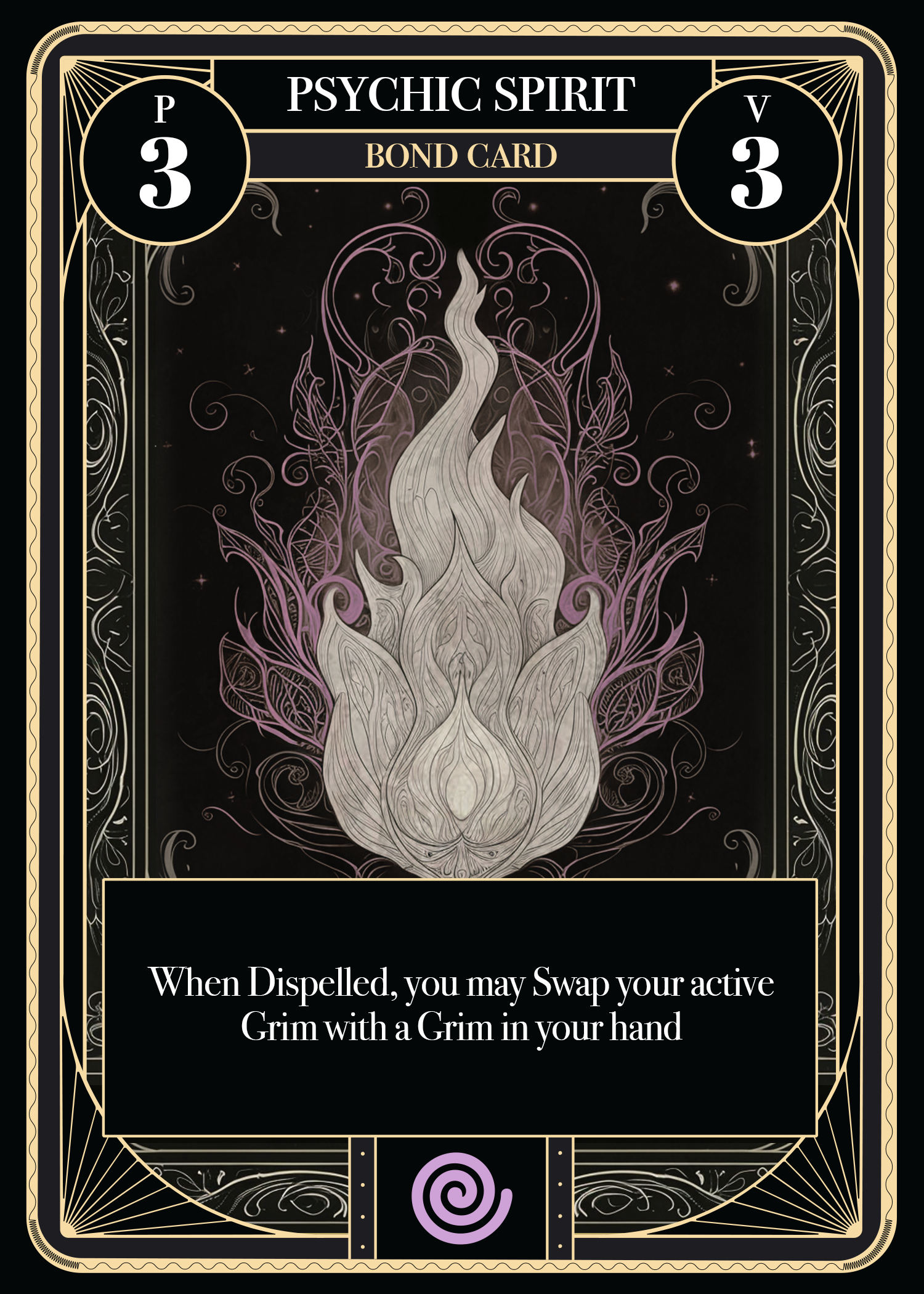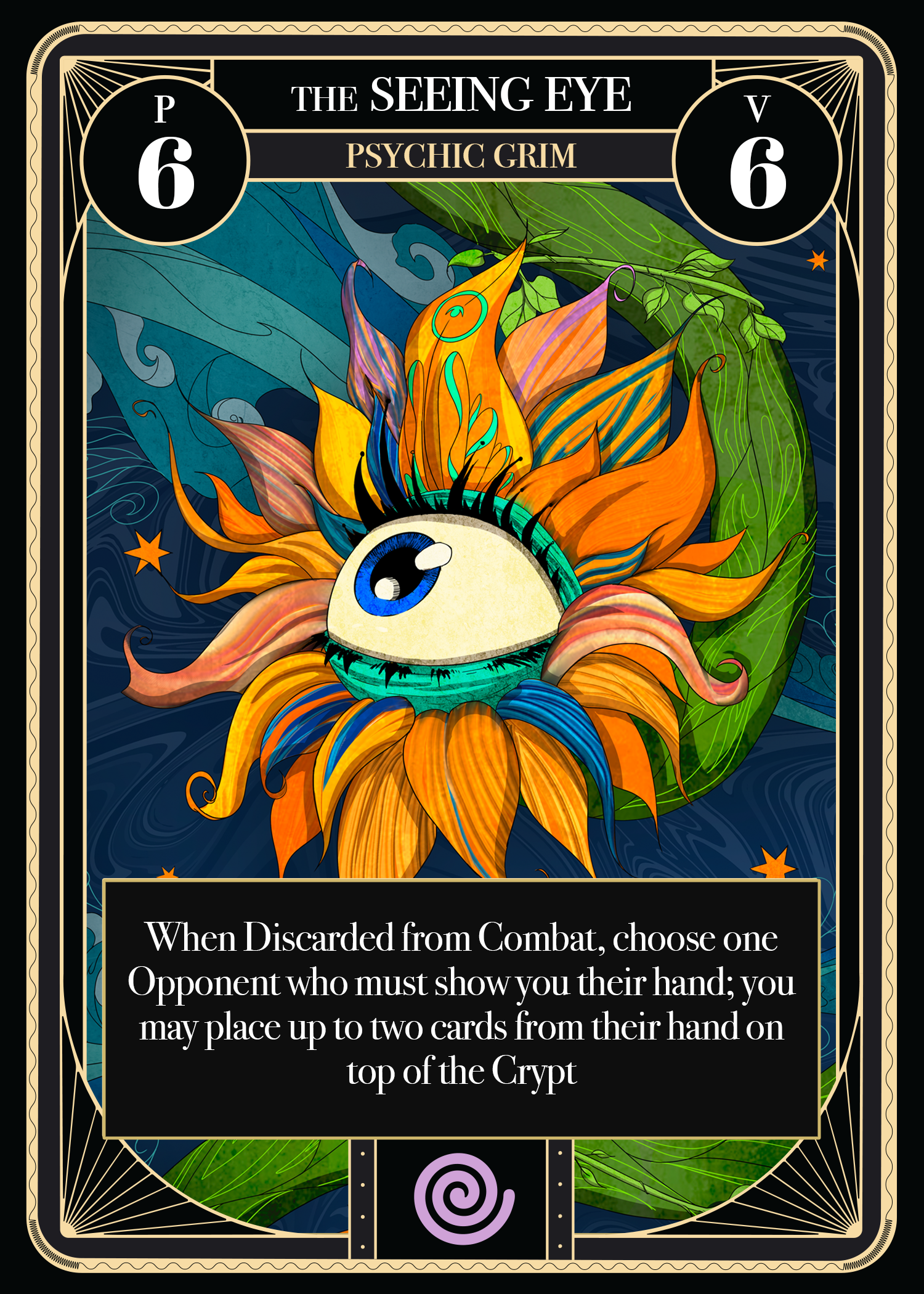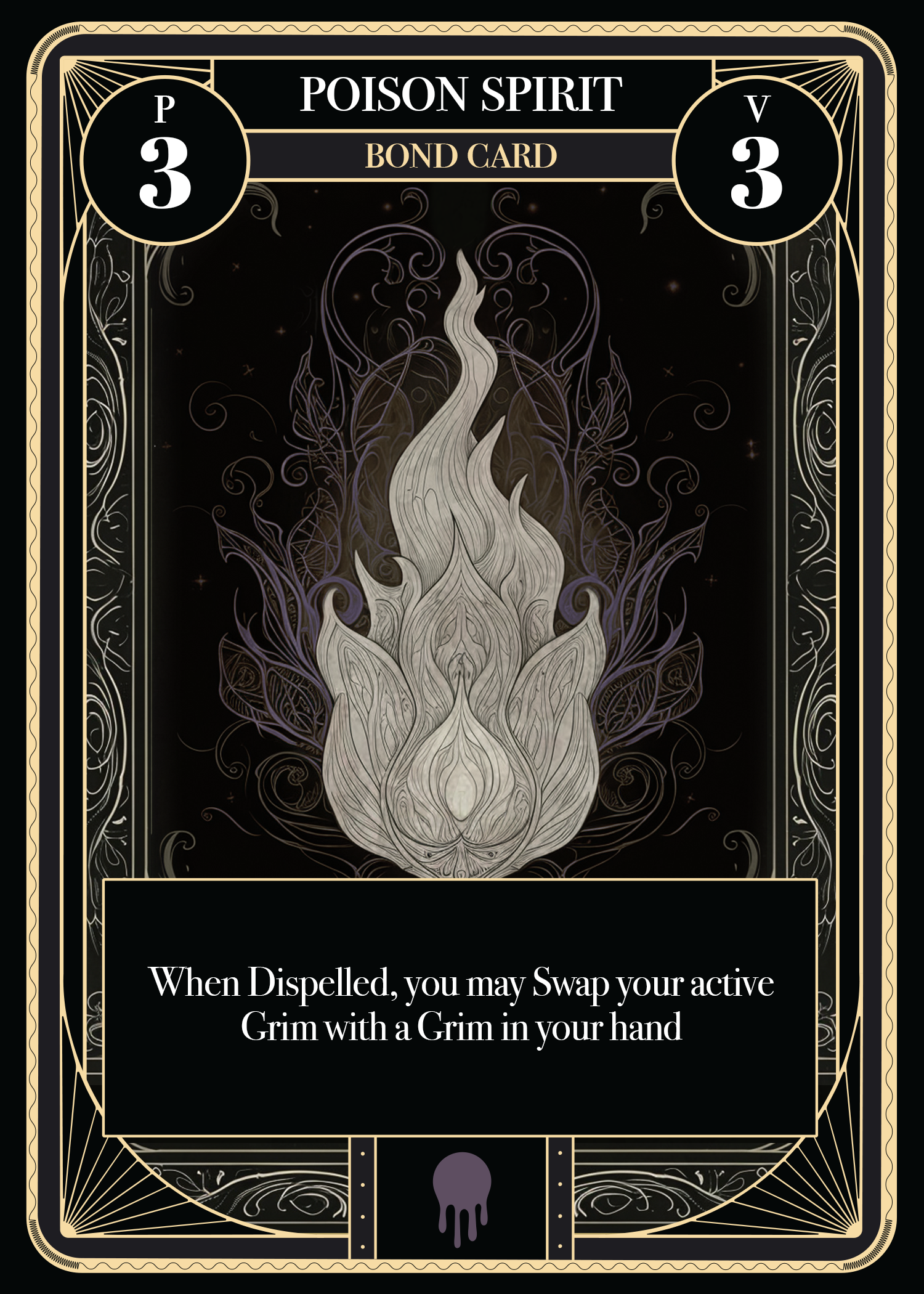
Welcome to BANISHED, a tarot-inspired fast-paced deck builder in which players will command Grim, otherworldly psychopomp, in war-style combat. Build your perfect team of Grim, conjure dark swords and poison cups, fortune wands and flinch curses, and face off to become The Fiend! Scroll to the bottom of this page to see the cards, and keep reading for the rules.
Banished is designed by Michael Paluzzi of Grimsong Games . Illustration is done by Rayven Studios and Michael Paluzzi. Michael writes each card independently to ensure that they are balanced as well as possible, and has prided himself on using his legal experience to keep terms, descriptions, and rules consistent. He hopes that you enjoy the same sense of wonder that he feels in each of the Grim Cards and their art nouveau, fairy tale style.
THE COMPONENTS
BANISHED contains:
45 Grim (3 of each Element plus 12 typeless Hollow Grim).
11 Elemental Swords
11 Elemental Cups
23 Spirits (1 of each Element plus 12 Hollow Spirits)
5 Curses
5 Wands
Throughout the game, you will need to track two values and one designation (final print components used for tracking are to be determined):
OBOL. A currency used to Conjure (purchase) cards from a revolving market (called the Spread). No player can have more than 9 Obol at any given time. A d10, chits, or any other method can be used to track Obol.
LIFE POINTS. You will begin the game with 20 Life Points. If you run out of Life Points, you lose the game. You will lose Life Points by Combat primarily. A d20 or any other method can be used to track Life Points.
FAVOR. The first player designation which passes each Round.
THE GAME
BANISHED can be played with 2-4 players. You and your Opponents will each begin with a standard deck of 12 cards (6 Hollow Spirits and 6 Hollow Grim) plus one chosen Elemental Grim of 4 Value. On your Turns, you and your Opponents will take several actions to prepare for a battle and to slowly improve your decks over time. The goal is to be the only player with Life Points remaining. However, there are many paths to get there—some players prefer to focus on Conjuring Wands to improve their combo potential, or Conjuring Curses to disrupt their Opponents; some prefer to collect many cards of one Element while others prefer to diversify their deck with many Elements. Experiment with all options and develop a unique strategy that works for you.
THE TERMS
Before detailing the cards of the game, it helps to understand some basic terms used in their descriptions.
POWER. Every card has a Power (P). Players will compare the total sum of their Powers in Combat.
VALUE. Every card has a Value (V). Value represents the cost in Obol to Conjure that card and the amount of Obol gained when Dispelling it.
CRYPT. The Crypt is a stack of Grim, Swords, Cups, Spirits, Wands, and Curses that are not owned by either player.
SPREAD. The Spread is a market of 5 cards revealed before each Round that are randomly dealt from the Crypt.
CONJURE. Conjuring is the purchase action. On your Turn, you can Conjure one or more cards from the Spread by paying its Value in Obol.
DISPEL. Dispelling is the selling action. On your Turn, you can Dispel one card from hand to gain its Value in Obol.
BANISH. Banishing is how you remove cards from your rotating deck. As in any deckbuilder, you should improve your deck over time. On your Turn, you can Banish one card from your hand only after you have Conjured at least one card from the Spread.
COMBAT. The phase at the end of a Round, after both players have taken Turns, in which players Reveal cards they’ve played on their Turns, do Damage, and Discard their played cards.
GRIM CARD. As noted above, the Grim are creatures that you battle with. You will play one Grim face-down in preparation for Combat on your Turn.
BOND CARD. Bond Card is the general designation given to a Spirit, Cup, or Sword that you have placed for Combat. You will generally play two Bond Cards face-down in preparation for Combat on your Turn. These will grant your Grim additional Power and may have additional effects.
SWAP. The act of changing one card that is in play out for another card, usually from hand. Once a card is played, it cannot be replaced without a Swap effect.
THE CARDS
GRIM CARDS. There are two types of Grim Cards: Hollow Grim, and Elemental Grim. During your Turn, you will play one Grim face-down to prepare for Combat.
HOLLOW GRIM. You begin the game with 6 Hollow Grim. The Hollow Grim exist in a rock-paper-scissors-like relationship in their effects. The Heart Scale wants to win in Combat; The Sleeping Death wants to lose in Combat; and The Temporal Sands wants to tie in Combat. If you can achieve these effects, they Banish themselves after Combat and provide you a perk.
ELEMENTAL GRIM. The Elemental Grim always have equal Power and Value of either 4, 5, or 6. The 4-Value Grim always have two effects, one triggered in Combat and the other triggered when the Grim is Dispelled or Banished. The 5-Value Grim tend to have damage-boosting effects. The 6-Value Grim tend to have strategy-based effects.
SPIRITS. There are two types of Spirits: Hollow Spirits and Elemental Spirits. During your Turn, you will play two Bond Cards face-down, either of which may be a Spirit.
HOLLOW SPIRITS. You begin the game with 6 Hollow Spirits. These have no effect, but will give nominal Power to your Grim in Combat.
ELEMENTAL SPIRITS. The Elemental Spirits have slightly higher Power and Value than Hollow Spirits, and each represent one Element (which can be useful for fulfilling certain effects). The Elemental Spirits also have an effect that triggers when they are Dispelled, allowing you to Swap your active Grim with another from hand, which can come in handy if you draw into something better mid-Turn.
SWORDS. There is a Sword for each Element. The Swords are high Power items that can double in Power if their effect’s condition is satisfied.
CUPS. There is a Cup for each Element. The Cups are low Power items that have very powerful effects that trigger in Combat.
WANDS. There are 5 Wands, each which costs 4 Obol to Conjure. These cannot be played as Bond Cards, but rather are played from hand during your Turn to trigger useful effects. When played, Wands are Discarded, but this is not the same as Dispelling (selling a card to your Discard for Obol). You can consider wands a free action.
CURSES. There are 5 Curses, each which costs 3 Obol to Conjure. When you Conjure a Curse, it goes to your Opponent instead of you. These cannot be Dispelled or Banished with your normal actions, but rather are forced to be played by the end of your Turn to trigger detrimental effects like taking damage or losing your Grim’s effect in Combat. You cannot end a Turn with a Curse in your hand.
THE SETUP
First, set aside all Hollow Grim and Hollow Spirits (which are marked near the top of the card with the word “Hollow”). Give each player 2 of each Hollow Grim and 6 Hollow Spirits. Next, set aside all of the 4-Value Elemental Grim. The remaining stack of cards not yet set aside will now be referred to as the Crypt. One player must begin the game with “Favor,” the player one designation (which should be tracked) that allows that player to take their Turn first in the Round—the other player will choose a 4-Value Grim to add to their deck first. Favor will be passed between Rounds. Given that both sides benefit in different ways, which player has “Favor” is generally mutually decided, but can be determined by any method. Both players choose their 4-Value Grim and shuffle them into their respective decks. Shuffle the remaining 4-Value Grim into the Crypt, and deal 5 cards from the Crypt into a line next to it that will be called the Spread. Each player draws 5 cards, and the match will begin.
THE TURNS
Beginning with the player that has Favor and moving clockwise, each take a Turn. Begin your Turn by gaining 2 Obol. As you take your turn, remember the following: always draw a card when your hand has less than 5 cards and no effects are currently taking place; the moment that your deck depletes and no effects are taking place, shuffle your Discard to make a new deck. Carry out the following in any order (all optional, but recommended):
DISPEL. Dispel one card from hand to gain its Value in Obol. You can never go above 9 Obol. This can only be done once per Turn.
CONJURE. Conjure any card from the Spread by paying its Value in Obol. When Conjuring, the card goes to your Discard. A Conjured Curse will go to your Opponent’s Discard. You may pay double to Conjure to hand instead. This can be done any number of times per Turn. Any time a space in the Spread is opened, replace it with something from the Crypt.
BANISH. You may only Banish after you have Conjured something. Place a card from hand into a separate Banished pile of cards that are no longer in your deck. This can only be done once per Turn.
PLAY. Play a Grim and up to two Bond Cards (Spirit, Sword, Cup) face-down. These plays can happen at any time throughout your Turn. You are not required to play two Bond Cards. If you do not play a Grim, you will have zero Power in Combat. You may also play Wands from your hand by following the text on the card. You must play Curses (other than Souls Curse) from your hand by following the text on the card; you cannot end a Turn with a Curse in your hand (other than Souls Curse, which expressly stays in your hand until its condition occurs).
Once all players have completed their desired actions, Combat will initiate.
THE COMBAT
All players flip their Grim and Bond Cards face-up, then carry out the following in order:
REVEAL. First, check whether any “When Revealed” effects are present. For all effects, the player with Favor will trigger theirs first (if multiple, in their chosen order), then each player moving left around the table will trigger theirs in order. A card with a “When Revealed” effect will trigger for the player controlling it, even if that card entered into the player’s control but was not revealed in their control. This means that, in certain instances, a “When Revealed” effect could trigger twice. For example, a card may trigger for the player with Favor during their Reveal step, then the next player may steal it with an effect during their Reveal step. Because it has entered their control and they have not completed their Reveal step, they trigger the effect as well.
DAMAGE. Next, compare the total Power of all players. Power is calculated by adding the Power of all cards Revealed for each player (inclusive of any effects that may modify Power). The player(s) with the most Power win in Combat, and will do damage to the other players by the differential in their Powers. This means that everyone can “win” in Combat if all Powers are equal. For example if Player 1 has 10 Power and Player 2 has 7 Power, Player 2 will take 3 damage to their Life Points. When playing with 3-4 players, a player is not removed from the game when their Life Points reach 0—they continue to play. If a player with 0 Life Points wins in Combat, no one takes damage, and that player gains 1 Life Point.
DISCARD. Finally, discard all cards from the playing field beginning with. the player with Favor then moving left around the table. If there are any effects that trigger when Discarded from Combat, carry them out now. Each player may Discard in any order.
Note that all effects are mandatory unless they are written expressly as permissive (e.g., “you may” language). After Combat, pass Favor to the next player in clockwise order, shuffle the Spread into the Crypt, deal a new Spread, and begin a new Round. The game ends when only one player has Life Points remaining.



